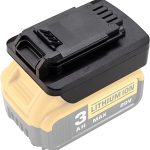Power Tool Battery Compatibility Chart
Published on . Updated on Dec 22, 2024.
Compatibility chart for power tool battery adapters with buy links, so that (e.g.) your DeWalt batteries and Ryobi tools are interchangeable with an adapter.
| DeWalt 20V Tool | B&D 20V 20V Tool | Milwaukee 18V Tool | Ryobi 18V Tool | |
| DeWalt 20V Battery | X | $21* | $14 | $11 |
| Black & Decker 20V Battery | $21 | X | $22 | $16 |
| Milwaukee M18 Battery | $19 | $20 | X | $18 |
| Ryobi 18V Battery | $18 | $24 | $18 | X |
I use the adapter with the * above all the time to power my Black and Decker tools with my DeWalt batteries. I’ve been using a similar $10 adapter to power my DeWalt 18V tools with my DeWalt 20V batteries for years, which even DeWalt manufactures now. You can even interchange DeWalt 20V Batteries:
- on DeWalt 18V tools ($10)
- to charge USB & USB-C devices ($14)
- on a Dyson stick vacuum ($21)
- on PowerWheels ($14)
- on 12V cigarette lighter products ($37)
- attached to jumper cables ($36)
What power tool batteries are interchangeable?
Since around 2021, many power tool batteries are interchangeable with inexpensive aftermarket adapters, indicated by the compatibility chart above. Other tools like Rigid may be compatible, but aren’t covered here. The adapters are usually plastic with the pins for one manufacturer’s battery on the bottom and for a different manufacturer on top. This changes the balance of the tool slightly since it adds around 1″ of distance between the tool and the battery. In many cases its also possible for the adapter to convert from 18V to 20V or 20V to 18V, since those conversions typically don’t generate too much heat.
Backstory
The DeWalt drill I got a decade ago is an awesome tool that always exceeds my requirements, but recently one of the batteries got weak and since I’m so cheap I fretted for months about what to do. The drill uses 18V NiMH batteries which are inferior to Li-ion and there is a newer 20V Li-ion product line, so was I really going to dig myself deeper hole of old technology? And what about the other tools I want? I really didn’t want multiple batteries and chargers and such. This prompted me to begin Googling which lead me to four amazing discoveries:
- Lithium-ion batteries that are compatible with 18V DeWalt tools exist, and
- 20V to 18V battery adapters exist, and
- Ryobi to DeWalt battery adapters exist, and
- There’s a buyers market for used 18V DeWalt tools
Li-ion batteries for my existing tools means I don’t need to upgrade to the 20V Li-ion right away to get the benefits of Li-ion. Battery adapters means that I can piecemeal upgrade my tools, and that I can mix-and-match brands. And the buyers’ market means that I can get tools at a heavy discount!
So here I am in tool nirvana. I went from a drill I liked with only 1 battery, and now $230 later I have:
- Pair of 5Ah 18V Li-ion batteries ($40)
- 18V cordless circular saw
- 18V cordless metal-cutting circular saw
- 18V cordless reciprocating saw
- 18V cordless jigsaw
- 18V cordless grinder
- 18V cordless shopvac
- 18V cordless flashlight
I think I got a great deal, but I am most pleased by the fact that if and when I want to get a 20V tool all I need to do is plunk down $15 for a battery adapter and then my entire 18V toolset can share the new battery. Then once I do, I could plunk down another $15 and be fully compatible with the Ryobi 20V line.
The interchangeability seems like a huge step forward.
